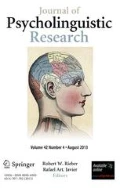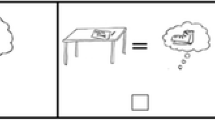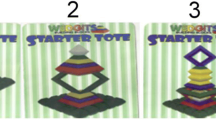Abstract
The importance of metacognitive language exposure to early educational achievement is widely recognized in the development literature. However, few studies have explored parents’ metacognitive language, while accounting for family SES and stress within the parent–child relationship. This is a preliminary descriptive study to explore metacognitive language to preschoolers during a collaborative task, and explored family SES (parent education and occupation) and stress within the parent–child relationship as predictors. Using partial correlations controlling for child age and language ability, parent education, occupation, and stress associated with parent–child dysfunctional interaction were found to significantly correlate with parents’ metacognitive questions. A hierarchical regression (controlling for child age and language ability) indicated that only parent education levels uniquely predicted questions overall.
Similar content being viewed by others
References
Abidin, R. R. (1995). Parent stress index (3rd ed.). Florida: Psychological Assessment Resources Inc.
Bakeman, R., & Gottman, J. (1987). Observing interaction: An introduction to sequential analysis (2nd ed.). Cambridge, UK: Cambridge University Press.
Barry, T., Dunlap, S., Cotten, S., Lochman, J., & Wells, K. (2005). The influence of maternal stress and distress on disruptive behavior problems in boys. Journal of the American Academy of Child & Adolescent Psychiatry, 44(3), 265–273.
Bartsch, K., & Wellman, H. (1995). Children talk about the mind. New York, NY, US: Oxford University Press.
Beeghly, M., Bretherton, I., & Mervis, C. (1986). Mothers’ internal state language to toddlers. British Journal of Developmental Psychology, 4(3), 247–260.
Benasich, A., & Brooks-Gunn, J. (1996). Maternal attitudes and knowledge of child-rearing: Associations with family and child outcomes. Child Development, 67(3), 1186–1205.
Bendell, R. D., Stone, W., & Field, T. (1989). Children’s effects on parenting stress in a low income, minority population. Topics in Early Childhood Special Education, 8, 55–71.
Berk, L., & Spuhl, S. T. (1995). Maternal interaction, private speech and task performance in preschool children. Early Childhood Research Quarterly, 12, 145–169.
Birbili, M., & Karagiorgou, I. (2010). Helping children and their parents ask better questions: An intervention study. Journal of Research in Childhood Education, 24(1), 18–31.
Bornstein, M., Hendricks, C., Haynes, O., & Painter, K. (2007). Maternal sensitivity and child responsiveness: Associations with social context, maternal characteristics, and child characteristics in a multivariate analysis. Infancy, 12(2), 189–223.
Bretherton, I., & Beeghly, M. (1982). Talking about internal states: The acquisition of an explicit theory of mind. Developmental Psychology, 18, 906–921.
Clarke-Stewart, K., & Beck, R. J. (1999). Maternal scaffolding and children’s narrative retelling of a movie story. Early Childhood Research Quarterly, 14(3), 409–434.
Damast, A., Tamis-LeMonda, C. S., & Bornstein, M. H. (1996). Mother-child play: Sequential interactions and the relation between maternal beliefs and behaviors. Child Development, 67(4), 1752–1766.
de Rosnay, M., Pons, F., Harris, P. L., & Morrell, J. B. (2004). A lag between understanding false belief and emotion attribution in young children: Relationships with linguistic ability and mothers’ mental-state language. British Journal of Developmental Psychology, 22(2), 197–218.
de Villiers, J., & Pyers, J. (2002). Complements to cognition: A longitudinal study of the relationship between complex syntax and false-belief-understanding. Cognitive Development, 17(1), 1037–1060.
Demers, I., Bernier, A., Tarabulsy, G., & Provost, M. A. (2010). Maternal and child characteristics as antecedents of maternal mind-mindedness. Infant Mental Health Journal, 31(1), 94–112.
Dickinson, D., & Smith, M. (1991). Preschool talk: Patterns of teacher–child interaction in early childhood classrooms. Journal of Research in Childhood Education, 6(1), 20–29.
Ely, R., Gleason, J., MacGibbon, A., & Zaretsky, E. (2001). Attention to language: Lessons learned at the dinner table. Social Development, 10(3), 355–373.
Feldman, S., Martinez-Pons, M., & Shaham, D. (1995). The relationship of self-efficacy, self-regulation, and collaborative verbal behavior with grades: Preliminary findings. Psychological Reports, 77, 971–978.
Fernyhough, C. (2008). Getting Vygotskian about theory of mind: Mediation, dialogue, and the development of social understanding. Developmental Review, 28, 225–262.
Flavell, J. (2000). Development of children’s knowledge about the mental world. International Journal of Behaviorial Development, 24(1), 15–23.
Forman, D., Aksan, N., & Kochanska, G. (2004). Toddlers’ responsive imitation predicts preschool-age conscience. Psychological Science, 15(10), 699–704.
Gallagher, T. (1981). Contingent query sequences within adult-child discourse. Journal of Child Language, 8(1), 51–62.
Garvey, C. (1977). The contingent query: A dependent act in conversation. In M. Lewis & L. Rosenblum (Eds.), Interaction, Conversation and the Development of Language. New York: Wiley.
Gauvain, M., & Rogoff, B. (1989). Collaborative problem solving and children’s planning skills. Developmental Psychology, 25(1), 139–151.
Grice, H. P. (1975). Logic and conversation. In P. Cole & J. L. Morgan (Eds.), Syntax and semantics, volume 3: Speech Acts (pp. 41–58). New York: Academic Press.
Hall, W., Bartlett, E., & Hughes, A. (1988). Patterns of information requests. New Directions for Child Development, 42, 43–58.
Hall, W., Scholnick, E., & Hughes, A. (1987). Contextual constraints on usage of cognitive words. Journal of Psycholinguistic Research, 16(4), 289–310.
Henry, L., & Norman, T. (1996). The relationships between memory performance, use of simple memory strategies and metamemory in young children. International Journal of Behavioral Development, 19(1), 177–199.
Hollingshead, A. B. (1975). The four factor index of social status. Unpublished working paper. Yale University.
Hresko, W., Reid, K., & Hammill, D. (1999). Test of early language development (3rd ed.). Austin, TX: Pro-ed Publishers.
Hughes, C., & Ensor, R. (2006). Behavioural problems in 2-year-olds: Links with individual differences in theory of mind, executive function and harsh parenting. Journal of Child Psychology and Psychiatry, 47, 488–497.
Huston, A., McLoyd, V. C., & Garcia Coll, C. (1997). Poverty and behavior: The case for multiple methods and levels of analysis. Developmental-Review, 17, 376–393.
Justice, E., Baker-Ward, L., Gupta, S., & Jannings, L. (1997). Means to the goal of remembering: Developmental changes in awareness of strategy use-performance relations. Journal of Experimental Child Psychology, 65(3), 293–314.
Kuhn, D. (2000). Metacognitive development. Current Directions in Psychological Science, 9, 178–181.
Kuhn, D., & Pearsall, S. (1998). Relations between metastrategic knowledge and strategic performance. Cognitive Development, 13, 227–247.
Kuhn, D., & Pease, M. (2010). The dual components of developing strategy use: Production and inhibition. In H. Waters, H. Waters, W. Schneider, & W. Schneider (Eds.), Metacognition, strategy use, and instruction (pp. 135–159). New York, NY, US: Guilford Press.
Lohmann, H., & Tomasello, M. (2003). The role of language in the development of false belief understanding: A training study. Child Development, 74, 1130–1144.
MacWhinney, B. (2000). The CHILDES project: Tools for analyzing talk, vol. 1: Transcription format and programs (3rd ed.). Mahwah, NJ: Erlbaum.
Martin, L., & Reutzel, D. (1996). Scaffolding books for children: Mothers’ metacognitive decisions. Reading Psychology, 17(2), 159–180.
Meins, E. (1997). Security of attachment and maternal tutoring strategies: Interaction within the zone of proximal development. British Journal of Developmental Psychology, 15(2), 129–144.
Meins, E. (1999). Sensitivity, security, and internal working models: Bridging the transmission gap. Attachment & Human Development, 1(3), 325–342.
Meins, E., & Fernyhough, C. (1999). Linguistic acquisitional style and mentalising development: The role of maternal mind-mindedness. Cognitive Development, 14(3), 363–380.
Meins, E., Fernyhough, C., Wainwright, R., Gupta, M., Fradley, E., & Tuckey, M. (2002). Maternal mind-mindedness and attachment security as predictors of theory of mind understanding. Child Development, 73(6), 1715–1726.
Meloth, M., & Deering, P. (1999). The role of the teacher in promoting cognitive processing during collaborative learning. In A. King & A. O’Donnell (Eds.), Cognitive perspectives on peer learning (pp. 235–255). Mahwah, NJ: Erlbaum.
Milligan, K., Astington, J. W., & Dack, L. A. (2007). Language and theory of mind: Meta-analysis of the relation between language ability and false-belief understanding. Child Development, 78, 622–646.
Neitzel, C., & Stright, A. (2003). Mothers’ scaffolding of children’s problem solving: Establishing a foundation of academic self-regulatory competence. Journal of Family Psychology, 17(1), 147–159.
Owen, M., & Cox, M. J. (1988). Maternal employment and the transition to parenthood. In A. Gottfried, A. Gottfried, A. W. Gottfried, & A. W. Gottfried (Eds.), Maternal employment and children’s development: Longitudinal research (pp. 85–119). New York, NY, US: Plenum Press.
Pappas, S., Ginsburg, H. P., & Jiang, M. (2003). SES differences in young children’s metacognition in the context of mathematical problem solving. Cognitive Development, 18, 431–450.
Peterson, C., & McCabe, A. (1996). Parental scaffolding of context in children’s narratives. In C. E. Johnson, C. E. Johnson, J. V. Gilbert, & J. V. Gilbert (Eds.), Children’s language (Vol. 9, pp. 183–196). Hillsdale, NJ, UK: Lawrence Erlbaum Associates, Inc.
Peterson, C., Jesso, B., & McCabe, A. (1999). Encouraging narratives in preschoolers: An intervention study. Journal of Child Language, 26(1), 49–67.
Radziszewska, B., & Rogoff, B. (1988). Influence of adult and peer collaborators on children’s planning skills. Developmental Psychology, 24(6), 840–848.
Rogoff, B. (1993). Play, cognitive development, and the social world: Piaget, Vygotsky, and beyond: Commentary. Human Development, 36, 24–26.
Rogoff, B. (1998). Cognition as a collaborative process. In D. William (Ed.), Handbook of child psychology: Volume 2: Cognition, perception, and language (pp. 679–744). Hoboken, NJ: Wiley.
Rogoff, B., Ellis, S., & Gardner, W. (1984). Adjustment of adult-child instruction according to child’s age and task. Developmental Psychology, 20(2), 193–199.
Rogoff, B., Mistry, J., Goncu, A., & Mosier, C. (1993). Guided participation in cultural activity by toddlers and caregivers. Monographs of the Society for Research in Child Development, 58(8), v-179.
Ruffman, T., Perner, J., & Parkin, L. (1999). How parenting style affects false belief understanding. Social Development, 8(3), 395–411.
Ruffman, T., Slade, L., & Crowe, E. (2002). The relation between children’s and mothers’ mental state language and theory-of-mind understanding. Child Development, 73(3), 734–751.
Stein, A. (1971). Strategies for failure. Harvard Educational Review, 41, 158–204.
Stright, A. D., Neitzel, C., Sears, K. G., & Hoke-Sinex, L. (2001). Instruction begins in the home: Relations between parental instruction and children’s self-regulation in the classroom. Journal of Educational Psychology, 93(9), 456–466.
Symons, D., Peterson, C., Slaughter, V., Roche, J., & Doyle, E. (2005). Theory of mind and mental state discourse during book reading and story-telling tasks. British Journal of Developmental Psychology, 23(1), 81–102.
Taumoepeau, M., & Ruffman, T. (2006). Mother and infant talk about mental states relates to desire language and emotion understanding. Child Development, 77(2), 465–481.
Thompson, R. B., & Williams, D. (2006). Exploring diversity within “poverty”: The role of education and emotional well-being in mothers’ metacognitive questions to children. Research in Human Development, 3, 191–209.
Vygotsky, L. S. (1986). Thought and language (A. Kuzulin, Trans.). Cambridge, MA: The M.I.T. Press. (Original work published 1934).
Wang, A. (1993). Cultural-familial predictors of children’s metacognitive and academic performance. Journal of Research in Childhood Education, 7(2), 83–90.
Webster-Stratton, C., & Hammond, M. (1988). Maternal depression and its relationship to life stress, perceptions of child behavior problems, parenting behavior, and child conduct problems. Journal of Abnormal Child Psychology, 16, 29–315.
Weizman, Z., & Snow, C. (2001). Lexical output as related to children’s vocabulary acquisition: Effects of sophisticated exposure and support for meaning. Developmental Psychology, 37(2), 265–279.
Welsh, M. (1991). Rule-guided behavior and self-monitoring on the Tower of Hanoi disk-transfer task. Cognitive Development, 6(1), 59–76.
Wertsch, J., McNamee, G., McLane, J., & Budwig, N. (1980). The adult-child dyad as a problem-solving system. Child Development., 51, 1215–1221.
Winsler, A., Fernyhough, C., & Montero, I. (2009). Private speech, executive functioning, and the development of verbal self-regulation. New York, NY, US: Cambridge University Press.
Zimmerman, C. (2007). The development of scientific thinking skills in elementary and middle school. Developmental Review, 27(2), 172–223.
Zucker, T. A., Justice, L. M., Piasta, S. B., & Kaderavek, J. N. (2010). Preschool teachers’ literal and inferential questions and children’s responses during whole-class shared reading. Early Childhood Research Quarterly, 25(1), 65–83.
Author information
Authors and Affiliations
Corresponding author
Rights and permissions
About this article
Cite this article
Thompson, R.B., Foster, B.J. Socioeconomic Status and Parent–Child Relationships Predict Metacognitive Questions to Preschoolers. J Psycholinguist Res 43, 315–333 (2014). https://doi.org/10.1007/s10936-013-9256-4
Published:
Issue Date:
DOI: https://doi.org/10.1007/s10936-013-9256-4




